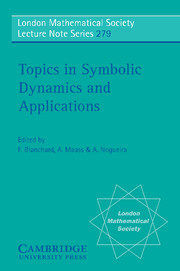Book contents
- Frontmatter
- Contents
- FOREWORD
- 1 SEQUENCES OF LOW COMPLEXITY: AUTOMATIC AND STURMIAN SEQUENCES
- 2 SUBSTITUTION SUBSHIFTS AND BRATTELI DIAGRAMS
- 3 ALGEBRAIC ASPECTS OF SYMBOLIC DYNAMICS
- 4 DYNAMICS OF ℤd ACTIONS ON MARKOV SUBGROUPS
- 5 ASYMPTOTIC LAWS FOR SYMBOLIC DYNAMICAL SYSTEMS
- 6 ERGODIC THEORY AND DIOPHANTINE PROBLEMS
- 7 NUMBER REPRESENTATION AND FINITE AUTOMATA
- 8 A NOTE ON THE TOPOLOGICAL CLASSIFICATION OF LORENZ MAPS ON THE INTERVAL
5 - ASYMPTOTIC LAWS FOR SYMBOLIC DYNAMICAL SYSTEMS
Published online by Cambridge University Press: 05 August 2013
- Frontmatter
- Contents
- FOREWORD
- 1 SEQUENCES OF LOW COMPLEXITY: AUTOMATIC AND STURMIAN SEQUENCES
- 2 SUBSTITUTION SUBSHIFTS AND BRATTELI DIAGRAMS
- 3 ALGEBRAIC ASPECTS OF SYMBOLIC DYNAMICS
- 4 DYNAMICS OF ℤd ACTIONS ON MARKOV SUBGROUPS
- 5 ASYMPTOTIC LAWS FOR SYMBOLIC DYNAMICAL SYSTEMS
- 6 ERGODIC THEORY AND DIOPHANTINE PROBLEMS
- 7 NUMBER REPRESENTATION AND FINITE AUTOMATA
- 8 A NOTE ON THE TOPOLOGICAL CLASSIFICATION OF LORENZ MAPS ON THE INTERVAL
Summary
Zaqueu COELHO
Dept. of Mathematics, Statistics and Operational Research
Nottingham Trent University
Burton Street, Nottingham NG1 4BU
United Kingdom
These are notes of a mini-course given in the Summer School on Symbolic Dynamics, Temuco (Chile), January 1997. The aim is to present some results concerning asymptotic limit laws for the occurrence of asymptotically rare events associated with some symbolic dynamical systems. The results will be mainly presented for shifts of finite type, but there will be left questions of whether these results remain valid for more general or possibly intrinsically different subshifts.
Introduction
It is natural in Probability Theory to study the asymptotic behaviour of random events, when these events are subject to conditions which make them vary in probability. Special concern has been given to studying how long one has to wait in order to see the occurrence of these events. The typical example of this approach, is a simple random walk on the states {0, 1, …, N} with a reflecting barrier at N and an absorbing barrier at 0. In this case, one is interested to know how the law of the random time for absorption behaves asymptotically when N diverges. Rescaling these times by N log(N) gives rise to a limit law of an exponential random variable (cf. [2]). Hence, in general, the usual question is to decide which scale is best suited to describe the asymptotic behaviour, and then to show whether there is convergence in law to some well known distribution.
- Type
- Chapter
- Information
- Topics in Symbolic Dynamics and Applications , pp. 123 - 166Publisher: Cambridge University PressPrint publication year: 2000
- 7
- Cited by



